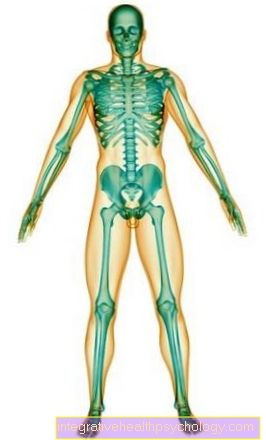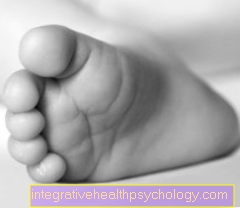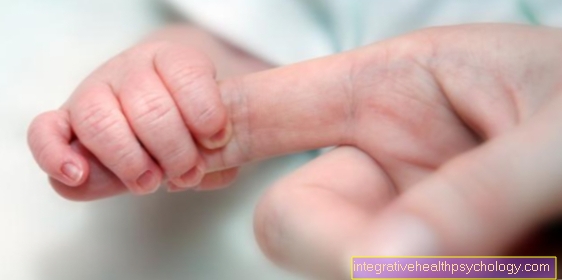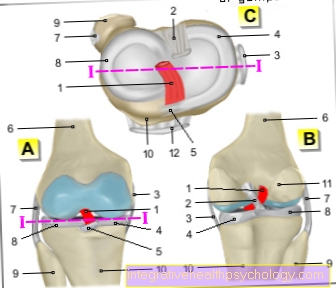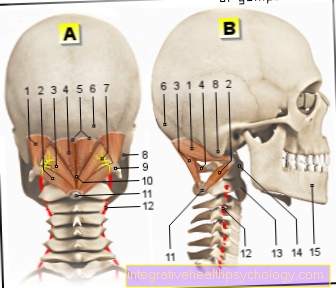Side effects of amitriptyline
Why does amitriptyline cause side effects?
There are several reasons why amitriptyline causes side effects. The main reason is that amitriptyline acts as a psychotropic drug centrally in the brain and thus influences the most important switching point in the human body. Therefore, amitriptyline antidepressant therapy always leads to various side effects, some patients being more affected than others. Why amitriptyline causes side effects and why some patients are more affected by them than others is still not fully understood. The side effects of amitriptyline arise, among other things, from the fact that amitriptyline ensures that increased amounts of the messenger substances (neurotransmitters) norepinephrine and serotonin are active in the brain and blood.
On the one hand, these messenger substances ensure that there is an antidepressant effect, but on the other hand, there is also an activation of other receptors, such as receptors on the heart. This can then lead, for example, to a patient experiencing repeated heart stumbling (palpitation). Why amitriptyline causes side effects can also be explained by the fact that it has a so-called anticholinergic effect in the brain. This means that the effect of the messenger substance acetylcholine is reduced. Acetylcholine is particularly important for maintaining concentration. If there is a reduction in this messenger substance, concentration disorders and a certain drowsiness result.

Weight gain
A Weight gain taking amitriptyline therapy is one of the most common side effects. The weight gain comes about because the patient keeps taking the drug Food cravings gets. This changes his food intake and leads to weight gain faster. Another reason for weight gain from amitriptyline is that the gastrointestinal tract (gastrointestinal tract) in many patients out of balance and it increases Constipation (Constipation) comes.
Another reason for weight gain from amitriptyline may be that a patient who is severely depressed may often forgets Ingesting food. The ingestion of amitriptyline then has a mood-enhancing effect, which stimulates the patient to eat more again and participate more actively in life. In this case, the weight gain is due to amitriptyline also quite positive, however, in most cases it is more of a side effect and promotes diseases such as Diabetes mellitus (Diabetes) and heart problems (for example coronary heart disease). If amitriptyline causes severe weight gain, the patient should talk to the doctor treating them (psychiatrist or neurologist) about possibly changing the drug in order to avoid long-term consequential damage caused by weight gain.
Eye damage
Amitriptyline is a antidepressant drugwhich acts zantral in the brain and can thus lead to many side effects. Amitriptyline, among other things, can cause side effects in the eyes. On the one hand, this can lead to visual disturbances, especially if the patient also consumes alcohol.
On the other hand, it can happen that the patient has difficulties coordinating and adapting close-up and television viewing. This side effect of amitriptyline on the eye is called Accommodation disorder designated. Here, either seeing objects in the vicinity (Near accommodation) or seeing objects in the distance (Distant accommodation) impaired.
As a result, patients may have a. Due to the amitriptyline side effect in the eye wear glasses need to compensate for the reduced vision. A particularly common side effect on the eye caused by amitriptyline is one Hypoaccommodation. It is particularly difficult for the patient to see things in the vicinity clearly because the objects or letters are blurred. This manifests itself primarily in the fact that the patient has to hold the book or newspaper unusually far away from him in order to be able to read it.
The side effects on the eye caused by amitriptyline are often reversible after stopping the drug, which means that the patient can see normally again as soon as he no longer takes the drug. However, irreversible changes to the eye can also occur, but these are usually only minimal and can be completely compensated for by wearing glasses.
fatigue
The most common side effects of amitriptyline include the fatigue as well as the sleepiness. Especially at the beginning of treatment, it is very common that the side effects outweigh the actual antidepressant effect and the patients are therefore very sleepy and tired for the first 2 weeks. The reason that amitriptyline leads to side effects such as tiredness is that amitriptyline works in the brain and there is a so-called anticholinergic and easy antihistaminic Effect unfolds. This means that a diminished Acetylcholine Concentration prevails in the brain.
These messenger substances usually ensure that one is awake and focused. If amitriptyline now has a reduced effect or a reduced concentration of acetylcholine, then alertness and concentration also decrease. The patient notices this in the form of fatigue, Difficulty concentrating as well as slight confusion. However, not every patient experiences the same degree of tiredness or drowsiness. Some patients have almost no side effects from the drug, while other patients find the side effects so serious that they find it difficult to cope with everyday life. If this is the case, it is important to speak openly with the treating doctor (psychiatrist or neurologist) so that he can change the medication if necessary. In general, the side effect fatigue is very common when taking amitriptyline, but should improve significantly after the first 2 weeks of use.
Side effects on the skin
The drug amitriptyline is a Psychotropic drug, a drug that works primarily in the brain. Because of its general effects in the brain, treatment with amitriptyline also leads to many different side effects. Some of the side effects of amitriptyline affect the skin. This can be caused by taking the drug in rare cases, skin rashes come, these then often to a Intolerance reaction based on amitriptyline. If a skin rash occurs as a side effect of amitriptyline, it is to consult a doctor as it may be an intolerance reaction (allergic reaction).
Another side effect of amitriptyline that affects the skin is increased sweating. This is a fairly common side effect that affects around every tenth patient. Only in very rare cases does it happen changes in blood flow to the skin, although it has not yet been proven with certainty whether this phenomenon is related to the use of amitriptyline. It is the so-called Raynaud's phenomenon, especially for the patient in cold or stressful situations suddenly white fingers or feet to get. This is due to decreased blood flow to the skin. The fingers or feet then become reddened when exposed to heat, as they are then supplied with blood again.Whether this side effect of skin blood flow can be explained by amitriptyline has so far only been confirmed by a New Zealand study.
In general, skin changes as a side effect of amitriptyline are common, but in comparison to others Antidepressants rather seldom. A generalized rash often indicates an intolerance. It also happens faster Sunburns (due to the increased photosensitivity), which is why patients take the amitriptyline, on one adequate light protection should pay attention. Occur in rare cases Hyperpigmentation on. This means that the skin on some parts of the body, such as the genital or armpit area, turns darker. Serious skin side effects from amitriptyline are generally, however rather seldom and not expected.
Side effects on the heart
Above all, patients taking amitriptyline must in the first 2 weeks expect more adverse effects. Side effects from amitriptyline occur particularly frequently, which cause the heart affect. On the one hand, it can happen that a Heart failure is increased, which is why patients with such a disease are not advised to take amitriptyline.
Amitriptyline can also cause side effects on the heart, such as a faster heartbeat (Tachycardia) or palpitations (Palpitations). Changes in the EKG occur frequently (i.e. in one in ten patients) while taking amitriptyline. In addition, the patient gets more dizzy after getting up, as this Cardiovascular system can be influenced by armitriptyline. A so-called orthostatic hypotensionwhich means that the Blood pressure is very low. This can make the patient dizzy if they stand up too quickly because the brain cannot get enough blood for a short time. Since many of the side effects of amitriptyline affect the heart, it is important that patients are regularly examined with the help of an EKG and that the patient informs their doctor of this if they experience frequent heart palpitations or if they themselves experience a rapid heartbeat.
In general, amitriptyline often (in 1-10% of all patients) has side effects on the heart that lead to changes in the ECG. Furthermore, it can become a so-called AV block and this leads to irregular heartbeats (cardiac arrhythmias).
Duration of side effects
It is very difficult to estimate how long side effects will last with amitriptyline. In general, however, it is the case that in the first two weeks the side effects predominate, and thus emerge more strongly than the actual antidepressant properties of amitriptyline. This is due to the fact that it takes a certain time for the messenger substances Serotonin and Norepinephrine are present in increased concentrations in the brain and blood, which in turn leads to mood-enhancing and antidepressant effects.
The side effects of amitriptyline, on the other hand, set in earlier, as the so-called anticholinergic effect occurs after a few days and for Difficulty concentrating and increased tiredness. The duration of the side effect should be limited to the first 2-3 weeks. However, some patients may experience permanent side effects from amitriptyline.
It is important that the patient decides for himself whether the antidepressant effect of amitriptyline predominates and whether the drug improves the quality of life. How long the side effects persist when taking amitriptyline depends very much on the dose, weight and individual metabolism of the patient.
Decreased libido
In general, it is the Psychotropic drug Amitriptyline is a drug with many side effects. A fairly common central nervous side effect of amitriptyline is one Decreased libido. This means that many patients have decreased sexual pleasure due to the use of amitriptyline. In some cases this can go so far that the patient is taking the drug impotent becomes. However, this impotence is limited to the duration of the use of amitriptyline. If a patient stops taking amitriptyline, side effects such as loss of libido are reversible and after a short time the patient can again experience sexual pleasure.
In general, many male patients in particular are afraid of this undesirable effect, but one should keep in mind that patients in a depressive phase also have no sexual desire and cannot experience sexual pleasure (libido). Thus, the loss of libido as a side effect of amitriptyline is a side effect that patients should accept if it means that they are better again and can participate more actively in life. A decrease in libido occurs in approximately every 100 - 1000th patient. Impotence is also very rare.







